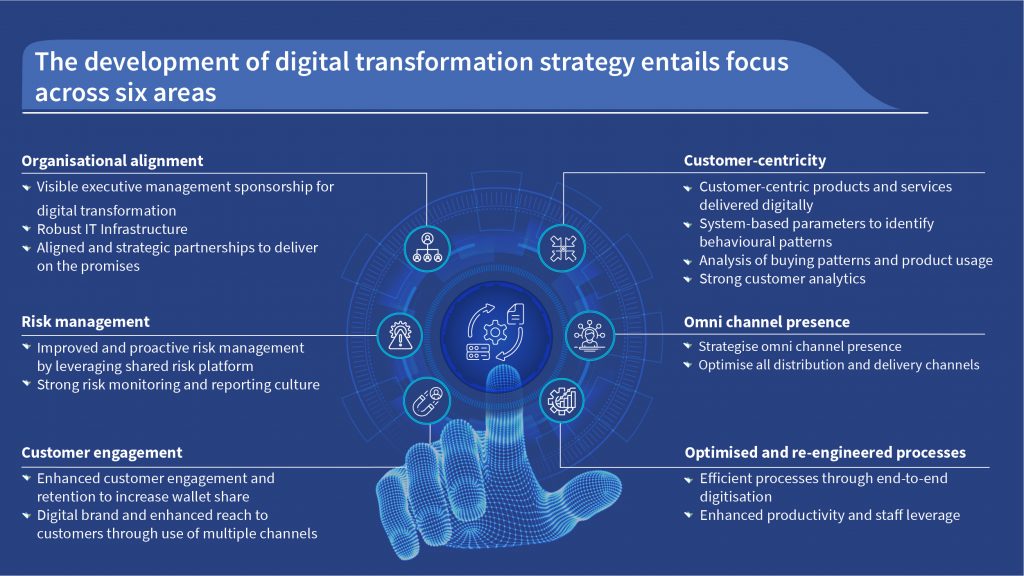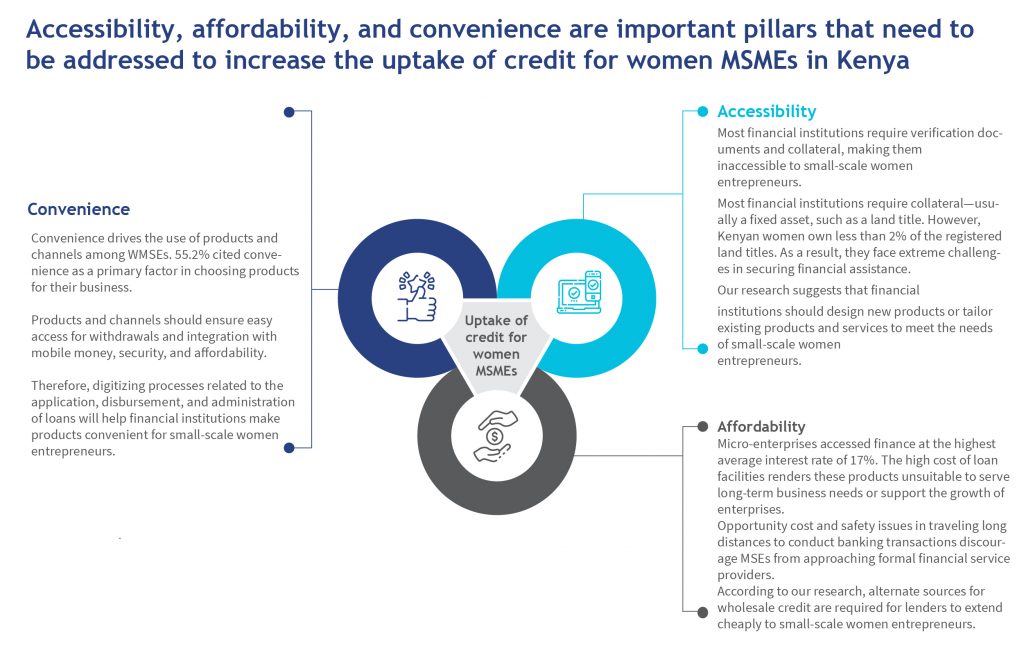How can customized and bundled digital financial services improve the lives of women micro and small entrepreneurs operating from open-air and cross-border markets? A case from Kenya
by Mandira Sharma and Kim Kariuki
Nov 25, 2022
5 min
Our blog highlights the challenges that stop financial services providers from developing cheaper, long-term credit that can unlock productive credit for women micro and small entrepreneurs operating from open-air and cross-border markets in Kenya. It also examines solutions these financial services providers can employ to serve these women effectively.
In our last blog, we featured the plight of Faith—a woman open-air and cross-border trader from Kenya. We highlighted the challenges she faces in accessing credit. We also discussed how existing solutions do not quite serve her needs.
But life was not always so hard for Faith. Before the COVID-19 pandemic, Faith was among the 45% of Kenyans living a comfortable middle-class lifestyle. She was a well-respected member of her community and the envy of her local women’s group. Her children went to good schools.
Faith owned a thriving retail business in her town that employed three full-time staff. She could comfortably service a USD 1,000 facility she had taken from Milly Finance (name changed), her local financial service provider. She would prepay her loans during good times to save on interest expenses. She was a model borrower for Milly Finance. She envisioned expanding her business and requested Milly Finance to extend her a credit line.
After the pandemic struck, the COVID-19-related restrictions dealt a fatal blow to Faith’s business. Her business was among 20% of businesses that closed permanently. Auctioneers picked off whatever they could to recover the outstanding loans. As she tried to manage the situation, she ended up depleting her savings reserves to pay her employees and keep her family afloat.
Things got so bad at the height of the pandemic that Faith had to downgrade her lifestyle. She moved to a different town. Unable to find meaningful work, Faith tried trading from an open-air market to supplement her income. She tried to borrow to make ends meet. However, risk-averse financial institutions meant little formal credit was available.
Further, formal credit providers did not lend to informal businesses like hers. Faith resorted to borrowing from an informal women’s group. As she was new to the area, she had not cultivated sufficient trust or savings to meet her needs. As a result, informal lenders became her primary source of capital despite their punitive rates.
No matter how hard she tries, Faith is yet to recover fully. Worse still, she no longer has confidence in formal financial institutions.
Like Faith, Milly Finance also struggled through the pandemic. More than 40% of Milly Finance’s portfolio deteriorated like many other financial institutions in Kenya, as many borrowers faced significant economic and financial impacts and thus could not service their loans. This situation forced Milly Finance to write off such loans.
Milly Finance also closed its local branches and now only operates from the capital city. However, it can barely survive and no longer afford to offer credit lines to micro-entrepreneurs. Instead, Milly Finance has anchored its turnaround strategy on lending to salaried up-market customers. Its dreams of digital transformation are shattered.
Even in the best times after COVID-19, Milly Finance and other financial institutions would struggle to meet the needs of micro-entrepreneurs like Faith.
According to our research, financial institutions find it difficult to cost-effectively tailor financial products for micro-entrepreneurs. Tailoring financial products for micro-entrepreneurs is difficult due to costs driven partly by the lack of scale to justify the business case.
Digitization can enhance scale, lower operational costs, build resilience, and offer convenience to customers. Digitization can also serve as a tool that financial institutions can use to support micro-entrepreneurs in recovering from the effects of the pandemic.
Digital transformation for financial institutions is critical for them to remain relevant and competitive in an increasingly digital landscape. Beyond costs to implement, digitization also requires effective change management procedures and commitment from the board and senior management. If these essential components are lacking, efforts to transform the financial institution are often met with resistance and are short-lived.
Click here to watch our webinar on digital transformation for more insights.
A transition to risk-based lending and using alternate data to appraise customers would also be a game-changer. Unfortunately, these investments require upfront capital, which is not easy for Milly Finance and other financial institutions to come by in a post-pandemic and high-inflation environment.
Moreover, Kenya’s macroeconomic outlook makes it difficult for financial institutions, such as Milly Finance, to obtain wholesale credit cheaply. With a weakened shilling and reduced foreign currency reserves, lenders face high currency risk when servicing dollar-denominated debt. Locally, the situation is worse. With the 91-day T-bill rate at 9%, the government continues to borrow heavily from the domestic market to meet its development agenda due to an inability to access funds at cheaper rates internationally. This dependence on the domestic market raises lending costs and makes it harder for Milly Finance and others to extend affordable credit to micro-entrepreneurs like Faith.
Fortunately, the government is aware of the challenges that micro-entrepreneurs currently face. In partnership with the private sector, the government has rolled out new measures to lower short-term credit costs and whitelist excluded borrowers. In addition, the government has increased access to affordable, accessible, and convenient credit through the Hustler Fund to fulfill its mandate. The USD 500 million annual Hustler Fund will enable micro-entrepreneurs to access loans ranging from USD 5 to USD 500 at an interest rate of 8% per annum.
Undoubtedly, the promise of a single-digit, unsecured credit delivered digitally is attractive to Faith and others like her. Sadly, none of the government’s solutions would solve the problem for Milly Finance or similar financial institutions that face liquidity challenges.
Based on our work with financial institutions in Kenya’s financial sector, we observe that most institutions urgently need solutions that address the three pillars of credit: accessibility, affordability, and convenience.
Affordable, convenient, and accessible credit can become the norm for borrowers and lenders in Kenya by deploying targeted interventions on the demand and supply side. This paradigm shift has the potential to usher in a new future where informal micro-enterprises can flourish, expand, formalize, and contribute meaningfully to the country’s economy. This shift would be significant as more than 80% of Kenyans are engaged in the informal sector, which forms 98% of all business activity in the country.
Struggling financial institutions can follow a similar roadmap to regain their footing and cement their legacy in delivering credit that can unlock productive sectors of the economy.
Written by

 by
by  Nov 25, 2022
Nov 25, 2022 5 min
5 min 


Leave comments